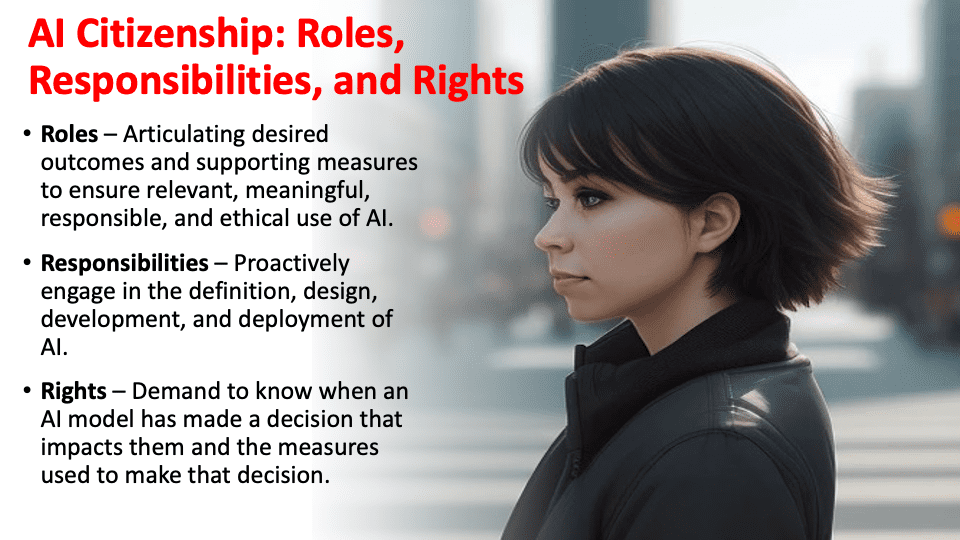
2024 promises to be a breakout year for Generative AI (GenAI) and AI. However, there are two challenges that organizations will face in 2024 to “leverage AI to get value from their data.”
Challenge #1: Too much focus is on “implementing AI” and not enough on gaining organizational alignment regarding where and how value will be created using AI. We covered this challenge in the first two blogs. In Part 1,” we discussed the importance of embracing an economic mindset to avoid falling into the productivity trap. In Part 2, we dug into the concept of nanoeconomics and its “force multiplier” role in the data economics value chain.
Let’s move on to Challenge #2: Empowering the organization to identify where and how AI can be leveraged to create value. That means implementing an AI and data literacy framework so everyone understands their roles, responsibilities, and rights in ensuring that AI delivers meaningful, relevant, responsible, and ethical outcomes.
AI & Data Literacy Educational Framework
The AI & Data Literacy Educational Framework that I outline in my book “AI & Data Literacy: Empowering Citizens of Data Science” is comprised of seven dimensions (Figure 1):
- Data & Privacy Awareness is about understanding data sources and types, especially the privacy opportunities and challenges associated with “Big Data.”
- AI & Analytic Techniques is about understanding the different levels of analytics maturity and the critical analytic techniques that can be applied to data.
- Making Informed Decisions involves applying critical thinking and building decision models with data and analytics.
- Prediction & Statistics is about understanding the basic concepts and methods of statistics and probability and how they can improve decision-making.
- Value Engineering Competency is about leveraging data and analytics to create “value” for your organization and customers.
- Ethics integrates moral principles and ethical values into AI models and decision-making.
- Cultural Empowerment is about creating a culture of empowered “Citizens of Data Science” who can leverage AI and data for value creation and innovation.

Figure 1: “AI & Data Literacy: Empowering Citizens of Data Science”
While Ethics might be the beating heart of the AI and data literacy educational framework, Cultural Empowerment is the enabler. Without Cultural Empowerment, the other dimensions don’t matter.
Keys to Cultural Empowerment
Cultural empowerment means embracing ambiguity, diversity, collaboration, experimentation, and learning from failures.
The secret sauce to success in AI and data literacy is cultural empowerment. Here are the key concepts for achieving cultural empowerment.
- Personalize the Organization’s Mission: Seek to inject your personal passions and values into the organization’s core purpose. Create personalized mission statements that ensure everyone feels connected to the bigger picture and understands how their work contributes.
- Speak the Language of Your Customers: Master understanding the language of your customers and constituents and use their language to describe their needs and challenges. It’s about ensuring clear, concise communication that resonates with the audience. This fosters trust, collaboration, and, ultimately, better solutions.
- Foster Organizational Improvisation: Embrace a culture of experimentation and agility, where employees are encouraged to try new things, learn from mistakes, and adapt quickly to changing circumstances. This requires dismantling rigid structures and hierarchies and allowing teams to self-organize and make decisions independently, yet with accountability for making intelligent, informed decisions and sharing the results of those decisions to drive continuous learning.
- Embrace an “AND” Mentality: It’s tempting to fall into an “either/or” mentality, pitting one idea or belief against another. Instead, encourage an “AND” mentality, where different perspectives and approaches are seen as complementary rather than conflicting, fueling the drive toward innovation.
- Ensure Everyone Has a Voice: Empowering cultural transformation requires amplifying voices that might otherwise be unheard. This means actively seeking diverse perspectives, creating safe spaces for open dialogue, and encouraging dissent.
- Unleash the Curiosity-Creativity-Innovation Pyramid: Build a culture that fosters a constant cycle of learning, exploration, and invention, encouraging experimentation that fuels creativity, allowing individuals to connect seemingly disparate ideas and forge new paths leading to breakthrough advancements (Figure 2).

Figure 2: The Path to Human Empowerment and Innovation
Cultural Empowerment Summary
The first GenAI / AI challenge organizations will face in 2024 in leveraging AI to derive value from their data is an economics challenge and not settling for nebulous productivity improvements. The key is to leverage nanoeconomics and the data economics value chain to drive new sources of customer, product, service, and operational value (Figure 3).

Figure 3: Data Economics Value Chain
The second GenAI / AI challenge organizations will face is empowering everyone to identify where and how GenAI / AI can be leveraged to create value. That means we must clarify and educate everyone on their roles, responsibilities, and rights concerning how AI impacts their lives. The key to becoming a “citizen of data science” is understanding:
- Your Role in articulating their desired outcomes and the measures against outcomes’ effectiveness should be measured to ensure AI’s relevant, meaningful, responsible, and ethical use.
- Your Responsibilities to proactively participate in defining, designing, developing, and deploying AI.
- Your Rights to know when an AI model has been used to make a decision that impacts them and the measures the AI model used to make that decision.

Figure 4: AI Citizenship: Roles, Responsibilities, and Rights
To avoid unintended consequences, confirmation bias, and citizen disenfranchisement from AI, everyone must know their roles, responsibilities, and rights for where and how AI is applied to their lives. And we cannot wait for our government, academic, or corporate institutions to solve this problem for us. As a citizen of data science, we must step up and own our roles, responsibilities, and rights. Your future, and the future of our society, depends on it.
